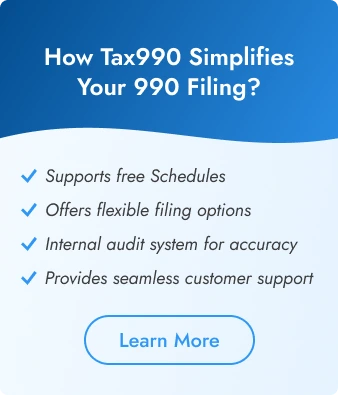What Should 501(c)(3) Private Foundations Know About Form 990 Filing?
- Updated August 14, 2023 - 2.00 PM - Admin, Tax990
Generally, organizations that obtain tax-exempt status under section 501(c)(3) are classified either as Public Charities or Private Foundations by the IRS.
In this article, you can find detailed information about private foundations and their tax filing requirements.
Table of Contents
How does the IRS Define Private Foundations?
Private foundations are organizations that are formed in order to further its exempt purpose and receives the majority of its support from a single major source such as an individual, family, or group
Generally, private foundations primarily make donations to other charitable organizations and individuals rather than directly participating in charitable activities.
Restrictions and Requirements on Private Foundations
The IRS has established certain requirements and restrictions on private foundations as follows,
Self-dealing between private foundations and their substantial contributors and other disqualified persons are restricted
Must distribute the income annually for charitable purposes
Holdings in private businesses are limited
The investments must not jeopardize the conduct of exempt purposes
Must assure that the expenses further exempt purposes
Different Types of Private Foundations
Generally, private foundations are classified by the IRS as follows
Private operating foundations
Exempt operating foundations
Grant-making (private nonoperating) foundations
Private Operating Foundations
Private Operating Foundations (POF) are organizations that allocate the majority of their resources to carry out exempt activities.
Exempt Operating Foundations
Private Operating Foundations qualify as Exempt Operating Foundations if they meet the following conditions,
Received public support for at least 10 tax years or was a private operating foundation on
January 1, 1983.
Consists of individuals fewer than 25% of disqualified individuals in its governing body at all times during the tax year, and are broadly representative of the general public.
Consists of no officer who is a disqualified individual at any time during the tax year.
Grant-Making Foundations
Private foundations that are not categorized as Private Operating Foundations and Exempt Operating Foundations will be treated as Grant-making foundations.
How can I Obtain 501(c)(3) Private Foundation Status?
Organizations that need to obtain 501(c)(3) private foundation status must file Form 1023, Streamlined Application for Recognition of Exemption Under Section 501(c)(3) of the Internal Revenue Code.
If the organization’s gross receipts are less than $5,000, they can choose to file Form 1023-EZ, based on their answers on the eligibility worksheet.
Any organizations that obtain 501(c)(3) tax-exempt status are automatically classified as Private Foundations unless they meet any of the criteria of Public Charities or they voluntarily apply for public charity status on Form 1023, Part X.
Steps to Obtain 501(c)(3) Private Foundation Status
1.
Register for an account on Pay.gov
2.
Search for “1023” and select it
3.
Complete the form
What are the Tax Filing Requirements for Private Foundations?
Organizations that obtained 501(c)(3) tax-exempt status and are classified as Private Foundations must file Form 990-PF, Return of Private Foundation or Section 4947(a)(1) Trust Treated as Private Foundation, annually to report their foundation’s revenue, expenses, assets, liabilities, compensation details, activities, etc. to the IRS.
Additional Filing Requirements for Private Foundations
Private foundations that generate $1000 or more from unrelated businesses are required to file Form 990-T.
Also, Private foundations that file Form 990-PF may be required to include Schedule B if they receive $5000 or more as contributions from any one contributor.
Deadline to file Form 990-PF:
Generally, private foundations must file Form 990-PF on or before the 15th day of the 5th month after their accounting period ends.
If your private foundation follows a calendar tax year, the deadline to file Form 990-PF is on
May 15th.
If your private foundation follows a fiscal tax year, use our due date calculator to find your Form 990-PF deadline
The IRS may impose penalties on private foundations that fail to file Form 990-PF on time or with incorrect information.Learn more
Simplify your Private Foundation’s 990-PF Filing with Tax 990!
Completing and e-filing Form 990-PF can be tedious. With Tax 990, you can eliminate all the complexities involved and e-file your Form 990-PF easily, securely, and accurately.
The following are helpful features of Tax 990 that simplify your Form 990-PF filing
Free Schedule B - Includes Schedule B automatically at no extra cost, based on the data you provide
Multiple Preparation Options - Form preparation made easier with Form-Based and Interview-Style filing options
Internal Audit Check - Audits your completed forms for any IRS errors before transmitting them
to the IRS.
Multi-User Access - Add users to manage the filing process or to review and approve your Form 990-PF
Free Retransmission - If your Form 990-PF filed with us got rejected, you can fix the errors and retransmit it for Free
Dedicate Customer Support - Our customer support team resolves your questions via live chat, phone, and email


